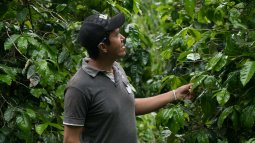It would seem logical that the smallest Central American coffee-growing country would produce microlots, but historically, much of the coffee was blended and sold to mills, without much lot differentiation and separation. The rise of specialty coffee in El Salvador has inspired many producers to start to identify and isolate individual varieties, and to experiment with sorting and processing, as a way of attracting buyers and getting higher prices, but access to those resources can still be difficult for smaller growers.
For the past few years, Café Imports green buyer Piero Cristiani—who is from El Salvador, and whose mother has a long history in coffee there—has embarked on a project designed to identify, reward, and bring to market the exceptional results of the hard, innovative work that producers are increasingly interested in doing here.
Focusing on the region of Chalatenango, Piero has partnered with a cupper and a local mill to buy small, select microlots from producers—some separated by variety, some by process, and some by both. We are buying the coffee in parchment and doing the ruling and final sorting and bagging ourselves, which allows for more quality control as well as the ability to package some of these very special small lots in custom 35-kilo Pequeños bags, to create more widespread access to these coffees to roasters.
Finca El Plan is a 1-manzana farm owend by Isaac Luna, planted with 2,700 coffee trees. There are three varieties planted on Isaac's farms, which includes the 4-manzana lot El Poso nearby: He grows around 80 percent Pacamara, with some Pacas and Bourbon. The coffee is picked ripe and depulped, then laid out to dry on raised beds as a Honey for about 20 days, depending on the weather.
Isaac produces about 35–40 quintales a year, and has been growing coffee for about 6 years, though he has Bourbon trees on his land that are upward of 45 years old! He says that his trees do struggle withojo de gallo, or "rooster's eye," a coffee pathogen to which Bourbon is not very resistant, and that winters have gotten harder as it stays colder and there is less rain, which makes the cherries develop less mucilage.
A visitor from Panama came through Isaac's church, exploring the area to develop new coffeelands and teach new processing methods. From this man, Isaac learned the Honey process: He was the first to process Honeys in this area. He sees coffee as an adventure and an opportunity, and as he continues to learn about the process and about cupping, he is anxious to hear feedback and learn how to improve. "Every time, the coffee is different," he says. "You can work harder, and although it's hard, it is very rewarding."
We are proud to offer these micro-microlots, and can’t wait for you and your customers to experience the delicious stuff that comes in these small packages.
For more information about coffee production in El Salvador, visit our El Salvador Origin Page.












